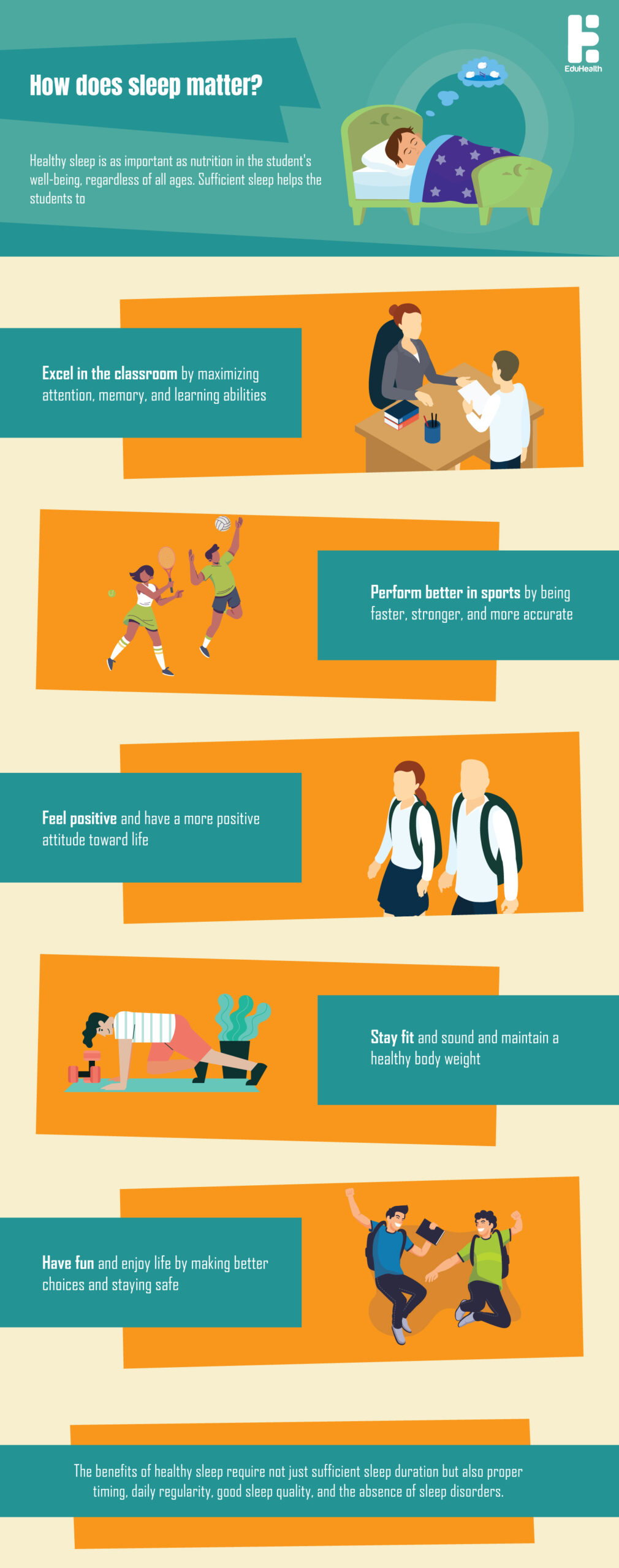A study by the Centers for Disease Control and Prevention (CDC) and the maternal child and health bureau has revealed that most American high school students and 34% of children don’t get enough sleep.
According to research, the new norms after the pandemic have created changes in children’s daily habits, including their sleep and wake schedules.
The reasons also include the increasing screen time and the lack of physical activities. As most students are back in school, students need to adjust to their new daily routines and get adequate sleep and rest.
In this article, you will find how important it is for students to have a good sleep, and the role school nurses play in identifying children with sleeping problems and educating them about Sleep health in Students.
Why is sleep important?
Sleep is an indispensable part of a child’s healthy lifestyle. Many studies have proven that a child who sleeps well has improved concentration, learning, consciousness, behavior, and overall physical and mental development.
Good sleep can also benefit children and help improve their resilience, learning, memory, and vocabulary skills.
Sleep is good for toddlers and helps their motor skill development, attention, and memory skills.
There is a recommended amount of sleep that children need based on their age category.
As per the American Academy of Pediatrics
- Infants below 1 year must have 12-16 hours of sleep
- Children below 2 years need 11-14 hours of sleep
- Children from 3 to 5 years need 10 to 13 hours of sleep
- Children from 3-5 years old need 10-13 hours of sleep
- Children from 6-12 years old need 9-12 hours of sleep
- and Teenagers from 13-18 years old need 8-10 hours of sleep

What are the reasons that cause sleep deprivation in students?
Many physiological reasons affect the sleeping habits of children. The proper understanding of sleep deprivation factors is crucial for curing sleep disorders.
Loss of sleep in children has been linked to the many physical and behavioral disorders in the student, like apnea, mood disorders, anxiety, and stress.
Lack of sleep can cause inattentiveness, poor academic performance, and signs of irritability in children.
Two distinct factors that lead to sleep deprivation in children are
Physical factors:
- Sleep-disordered breathing (SDB) is linked to sleep disorder issues in children. The symptoms include breathing through the mouth, snoring, and sleep apnea.
- Poorly controlled asthma, high body mass index, and restless leg syndrome may also lead to SDB in children.
- OSA or obstructive sleep apnea is also a factor found in children who have sleeping issues. It can lead to partial or complete obstruction in breathing and enlarged tonsils.
Behavioral and psychiatric factors:
- Various emotional factors like stress, anxiety and mood disorders cause sleep disturbances in children.
- Autistic children and children with ADHD (attention deficit hyperactivity) issues may have sleep loss.
- Children suffering from PTSD or trauma can experience problems like sleep enuresis, nightmares, night terrors, and sleepwalking.
- Nocturnal enuresis (bedwetting) may affect the children and cause nightmares, night terrors, and sleep deprivation.
Sleep deprivation impacts on student health
Children who are deprived of good sleep can easily become grumpy and hyperactive, a behavior that mimics ADHD.
Sleepiness will also affect the child’s attentiveness and performance at school. A child’s daily life will have massive impacts from lack of sleep.
Reduced sleeping hours can result in:
- Accidents and injuries
- Performance-related problems
- Memory concentration and learning problems
- Behavior problems
- Mood problems
- Reactions being slower
- Overeating
Poor sleeping patterns in children that are young have been linked to allergic rhinitis, immune system issues, anxiety, and depression.
Inadequate sleep during childhood may also carry future risks in the form of obesity, diabetes, and high blood pressure.
In adolescents, inadequate sleep can have long-term effects on academic performance and mental health.
What is student sleep health week all about?
It is a resolution introduced in the US house of representatives, designating the days from September 12th to 18th as student sleep health week. The initiative is supported by the American Academy of Sleep Medicine, and they conduct SSHW (student sleep health week) in American schools and for creating awareness in American students about the importance of healthy sleep in children and how it helps in their academic performance.
Tips to ensure students get good sleep
The best way for students to get good sleep is ensuring they follow a consistent bedtime routine. A consistent bedtime routine helps children get enough sleep.
School nurses can help educate children and parents on the importance of good sleep times and practices.
A good bedtime routine includes:
- Turning off computers, TVs, video games, mobile phones
- Switching off bright lights, creating a bedroom that’s dimly lit
- Create a cool and quiet sleepful environment.
- Reading a light book, singing a lullaby, or taking a bath
- Reduce the screen time of kids, stop watching screens by four hours before going to bed.
- Picking a stuffed animal or security blanket for the night for toddlers
Parents must identify sleepiness or tiredness in children. The best time they should be putting the child to sleep is when they’re sleepy, and not when they are already asleep.
Avoid actions like negotiating bedtime, using it as a punishment, allowing kids to consume sugary or caffeinated foods late in the day.
School nurse’s role in improving sleeping habits of students
School nurses understand how good sleep practices result in academic success.
The school nurse sleep assessment includes repeated interactions with the students and parents and identifying the children with sleeping disorders and trying to improve the child’s daily routines and sleeping habits.
Regular health screenings can help them diagnose issues and disruptive behavior in them. Signs like falling asleep in class, obesity, poor academic performance will also be recorded in the health screenings.
School nurses can utilize Eduhealth systematically and comprehensively to note and observe sleep deprivation behavior in children. The recorded information and the reports will help nurses identify the causes of sleep problems in students and educate the parents by giving them sleep tips for student health development.
School nurses like you who have profound knowledge of development, health promotion, and evidence-based intervention, are experts in working with families and children.
This is why you are uniquely positioned to explore various factors that hamper sleep in children as well as test how your interventions bring about positive changes in children’s behavior.
School nurses have a role to play in restoring good sleeping practices in the American youth and EduHealth is a tool they can rely on to play that role well.








